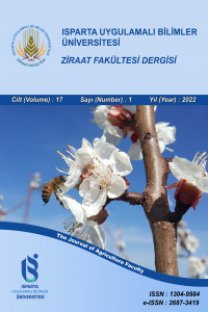Farklı Çinko ve Demir Dozlarının NC-7 Yer Fıstığı (Arachis hypogaea L.) Çeşidinde Verim ve Verim Ögeleri Üzerine Etkisi
Bu
çalışma farklı çinko ve demir dozlarının NC-7 yer fıstığı (Arachis hypogaea L.) çeşidinin verim ve bazı verim kriterlerine
etkilerini belirlemek için Çukurova şartlarında 2017 yılında yürütülmüştür.
Deneme iki faktörlü faktöriyel deneme desenine göre üç tekerrürlü olarak
kurulmuş ve yürütülmüştür. Çalışmada topraktan uygulanan farklı çinko ve demir
dozları yerfıstığında meyve verimi (kg/da), iç oranı (%), 100 tohum ağırlığı
(g), I. kalite meyve sayısı oranı (%) ve II. kalite meyve sayısı oranını(%)
istatistiki (p<0,05 ve p<0,01düzeyinde) bakımdan önemli seviyede
etkilemiştir. Farklı dozlarda çinko ve demirin toprağa uygulanmasında meyve
verimi 252,4 kg/da ile 634,1 kg/da arasında değişmiştir. Çalışmada; meyve
verimi (kg/da), iç oranı (%), 100 tohum ağırlığı (g), bakımından en uygun dozun
Zn3xFe1 (4 kg/da Zn x 1 kg/da Fe) interaksiyonu olduğu tespit edilmiştir.
Anahtar Kelimeler:
Çinko, Demir, Yerfıstığı, Çukurova, Verim
Effects of Different Zinc and Iron Doses on Yield and Some Yield Components of NC-7 Peanut (Arachis hypogaea L.)
This
study was conducted to determine the effects of the different doses of zinc and
iron on the yield and some yield properties of NC-7 peanut (Arachis hypogaea L.) under Çukurova
ecological conditions in 2017 growing season. The experiment was set up in
two-factors factorial design with 3 replications. In the study, different doses
of zinc and iron applied to soil had statistically significant effects (at the
level of p<0,05 and p<0,01) on pod
yield (kg/da), kernel ratio (%), 100 seed weight (g), the ratio of
first-quality fruits (%) and the ratio of the second-quality fruits (%).The pod
yield varied between 252,4 kg/da and 634,1 kg/da in different doses of zinc and
iron applied to the soil. In the study, Zn3xFe1 (4 kg/da Zn x 1 kg/da Fe) interaction was determined to be the most
suitable treatment accounting in pod yield (kg / da), kernel ratio (%), 100
seed of weight (g).
___
Alpaslan, M. ve S. Taban. 1996. Çeltikte ( ) çinko-demir ilişkisi. S. 5. A. Ü. Z. F. Tarım Bilimleri Dergisi, 2 (1): 45-49.Arıoğlu H.H., 2014. Yağ Bitkileri Yetiştirme ve Islahı. Çukurova Üniversitesi, Ziraat fakültesi Ders Kitabı No:220, A-70, Adana.
Barut, H., Şimşek, Tuğba., Irmak, S., Sevilmiş, O., ve Aykanat., 2017. The Effect of Different Zinc Application Methods on Yield and Grain Zinc Concentration of Bread Wheat Varieties, Turkish Journal of Agriculture-Food Science and Technology, C.5, S.8, Sayfa: 898-907.
Brohi A R, Karaata H, Özcan S, Demir M (2000). Topraktan ve yapraktan çinko uygulamasının ekmeklik buğday bitkisinin verim ve bazı besin maddesi alımına etkisi. Gaziosmanpaşa Üniversitesi, Ziraat Fakültesi Dergisi, 17(1): 123-128.
Çakmak I (2000). Role of zinc in protecting plant cells from reactive oxygen species. New Phytologist, 146: 185–205.
Erdem H., 2011. Silajlık mısır çeşitlerinin verim ve kalitesine çinko gübrelemesinin etkilerinin belirlenmesi Gaziosmanpaşa Üniversitesi, Ziraat Fakültesi Dergisi, 28(2): 199-206.
Fageria, N. K., V.C. Baligar and R.C. Wright, 1990. Iron nutrition of plants: An overview on the chemistry and physiology of its deficiency and toxicity. Pesq. Agropec. Bras. 25: 553–570.
Godsey, C. B., J.P. Schmidt, A.J. Schlegel, R.K. Taylor, C.R. Thompson and R.J. Gehl, 2003. Correcting iron deficiency in corn with seed row applied iron sulfate. Agron. J. 95: 160–166.
Gülmezoğlu, N., Aytaç, Z., 2016. Farklı Çinko Uygulamalarının Aspir Bitkisinin Verimi Ve Çinko Alımı Üzerine Etkisi, Toprak Su Dergisi. 2016,5(2):(11-17), Eskişehir.Güler, S., 2002. Bitki Besleme Çalışmalarında Bitki Analizlerinin Yorumu. OMU Ziraat Fakültesi Dergisi, 17 (1): 80-85. Samsun.
Irmak, S., A. N. Çil, H. Yücel and Z. Kaya, 2012, The effects of iron application to soil and foliarly on agronomic properties and yield of peanut (Arachis hypogaea), Journal of Food, Agriculture & Environment Vol.10 (3& 4), 417-422.
Irmak, S., A. N. Çil, H. Yücel and Z. Kaya, 2015, Effects of Zinc Application on Yield and Some Yield Components in Peanut (Arachis hypogaea) in the Easthern Mediterranean Region, Tarım Bilimleri Dergisi, Journal of Agricultural Sciences, 22, 109-116.
Jarrel, W. M., Beverly, R. B., 1981. The Dilution Effect in Plant Nutrition Studies Adv. In Argon. Vol. 34: 197-222.
Jones, J. B., 1985. Soil Testing and Plant Analysis: Guides to The Fertilisation of Horticultural Crops. Hort. Rev. Vol. 7 (ed. By Jules Janick), 1-68.
MacNaeidhe F S, Fleming G A (1988). A response in Spring cereals to foliar sprays of zinc in Ireland. Irish Journal of Agricultural Research, 27: 91-97.
Parlakay, O., 2011. “Türkiye’de Yerfıstığı Tarımında Teknik ve Ekonomik Etkinlik”, Çukurova Üniversitesi Fen Bilimleri Enst., Basılmamış Doktora Tezi, Adana.
Nasiri, Y., Zehtab-Salmasi, S., Nasrullahzadeh, S., Najafi, N. and Ghassemi-Golezani, K. 2010. Effects of foliar application of micronutrients (Fe and Zn) on flower yield and essential oil of chamomile (Matricaria chamomilla L.). Journal of Medicinal Plants Research 4(17):1733-1737.
Togay Y, Togay N, Kocakaya Z, Erdal I, Cig F (2005). Van koşullarında çinko uygulamasının farklı buğday çeşit ve hatlarında verim ve verim öğeleri üzerine etkisi. In: Proceeding of VI Field Crop Congress of Turkey 1: 595-600.
TÜİK.,2018. Türkiye İstatistik Kurumu İnternet Sitesi. http://tuikapp.tuik.gov.tr/bitkiselapp/bitkilel.zul.
Ülgen N, Yurtsever N (1984). Türkiye gübre ve gübreleme rehberi. T.C Başbakanlık Köy Hizmetleri Genel Müdürlüğü Toprak ve Gübre Araş. Enstitüsü Müdürlüğü Yayın No:209. Teknik Yayın No:66.
- ISSN: 1304-9984
- Yayın Aralığı: Yılda 2 Sayı
- Başlangıç: 2006
- Yayıncı: Isparta Uygulamalı Bilimler Üniversitesi
Sayıdaki Diğer Makaleler
Bitki fungal hastalıkları için antifungal ajan olarak uçucu yağlar
Mohamed SAİD OMAR, Şaban KORDALİ
Kurutmalık Elma Dilimleme Makinası Tasarımı ve Prototipinin Geliştirilmesi
Kayseri İli Çerezlik Kabak Meyvelerinde Çürüme: Risk Faktörleri ve Öneriler
H. Handan ALTINOK, Ender Şahin ÇOLAK, M. Alper ALTINOK
Zeolit ve Feldspatın Alternatif Kireçleme Materyali Olarak Değerlendirilmesi
Türkiye’nin Çekirdeksiz Kuru Üzüm İhracat Potansiyeli
